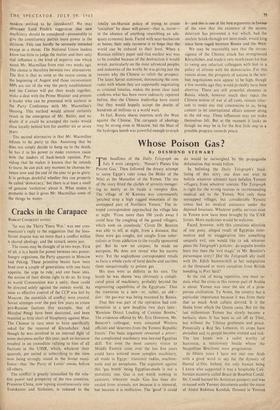Cracks in !he Carapace
ROBERT CONQUEST writes: `So was the Thirty Years War,' was one com- mentator's reply to the suggestion that the Sino- Soviet dispute was no more than a conflict within a shared ideology, and the remark seems just.
The issues may be thought of in two ways. First of all, it is a battle for power between two power- hungry organisms, the Party apparats in Moscow and Peking. These primitive beasts have been bred over a couple of generations with one basic appetite, the urge to rule; and one basic idea, the notion of their divine right to do so. So long as world Communism was a unity, these could be directed solely against the outside world. As soon as effective control of the CCP was lost by Moscow, the essentials of conflict were created. Soviet attempts over the past few years to create pro-Russian factions (for example, that of Marshal Peng) have been destroyed, and been resented as little shortof blasphemy against Mao. The Chinese in turn seem to have specifically asked for the removal of Khrushchev. And though he was involved in an internal fight of some sharpness earlier this year, such an intrusion resulted in an immediate rallying to him of all factions in the USSR, which, whatever their quarrels, are united in subscribing to the view now being strongly stated in the Soviet mani- festos—that `the Party of Lenin' comes before all others.
The conflict is greatly intensified by the rela- tive power and prosperity of the two countries. Primitive China, now lapsing simultaneously into Trotskyism and Stalinism, is reduced to the totally un-Marxist policy of trying to create `socialism' by sheer will-power—that is, terror— in the absence of anything resembling an ade- quate economic basis. Faced with near-barbarism at home, their only recourse is to hope that the world can be reduced to their level. When a Russian military paper said that nuclear war was to be avoided because of the destruction it would wreak, particularly on the most advanced peoples and industries of the world, he was giving just the reasons why the Chinese so relish the prospect. The latest Soviet statement, denouncing the com- rades with whom they are supposedly negotiating as criminal lunatics, makes the point clear (and confirms what has been more indirectly reported before, that the Chinese leadership have stated that they would happily accept the deaths of hundreds of millions in a world war).
In fact, Russia shares interests with the West against the Chinese. The carapace of ideology may be strong even in Moscow, but the blast of the hydrogen bomb was powerful enough to crack it—and this is one of the best arguments in favour of the view that the existence of the atomic deterrent has prevented a war which, had the nuclear break-through not been made, would long since have raged between Russia and the West.
We may be reasonably sure that the intran- sigence of the Chinese attack has strengthened Khrushchev, and made it very much easier for him to swing any reluctant colleagues with him in a policy of detente with the democracies. For this reason alone, the prospects of success in the test- ban negotiations now appear to be high, though a few months ago they would probably have been abortive. There are still powerful elements in Russia which, however much they reject the Chinese notion of war at all costs, remain reluc- tant to make any real concessions to us, being content to let international affairs simmer along in the old way. These influences may yet make themselves felt. But at the moment it looks as though we may be in for the first little step in a possible progress towards peace.






























 Previous page
Previous page